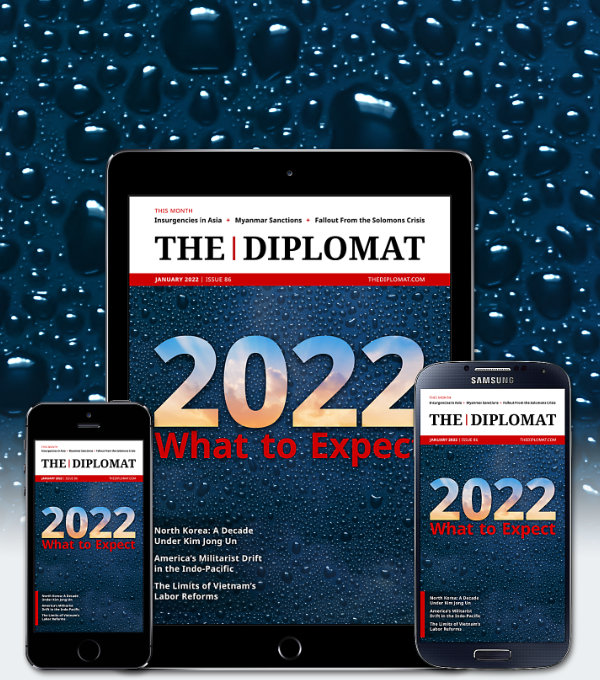| Welcome to the latest issue of Diplomat Brief. This week our top story focuses on the implications of the crisis in Kazakhstan for China’s Central Asia diplomacy. We also have an interview with South Korean Lt. Gen. (Ret.) Chun In-bum about South Korea’s security options amid North Korea’s growing missile threat. |
| Story of the week |  | DIPLOMACY After Kazakhstan Crisis, China Will Reassess Its Influence in Central AsiaWhat Happened: While Russia played a prominent role in Kazakhstan’s early January crisis, spearheading the CSTO troops called in to support the Kazakh government, China largely sat on the sidelines. Beijing was late in responding and its eventual framing – with an emphasis on “color revolution” – seemed out of step with both Moscow and Nur-Sultan. China has no particular reason to be unhappy with the current state of affairs in Kazakhstan, but the series of events emphasized a major weakness in China’s diplomacy in Central Asia. Our Focus: China, unlike Russia, does not have strong ties to Kazakhstan’s political elite, and Beijing definitely does not have a deep understanding of the factional divides that were playing out behind the scenes of Kazakhstan’s January unrest. “Beijing’s long-standing policy of non-interference, as well as the belief that a solid economic presence will automatically lead to a favorable image and increased voice in local politics, are some of the reasons China must contend with a limited political role” in Central Asia, Igor Denisov, a senior research fellow at the Institute for International Studies, Moscow State Institute of International Relations, writes for The Diplomat. China’s insistence on viewing local developments through the lens of China-U.S. geopolitical competition hasn’t helped either, Denisov notes: “According to local experts, over the past two years, Chinese diplomats in Central Asia have mostly asked questions regarding the role of NGOs and American and Turkish leverage in political processes… China’s poor understanding of internal power shifts is visible with respect to Kazakhstan.” What Comes Next: There’s no reason to believe that Kazakh President Kassym-Jomart Tokayev will rethink relations with China. However, Beijing should be rethinking its approach to Kazakhstan and, more broadly, Central Asia. Simply put, China can no longer afford to leave all regional security affairs in Moscow’s hands and focus solely on economics. Political risks Beijing does not see coming can very much hurt its interests, even if the impact was limited in this particular case. As Denisov writes, “The rapid disintegration of an outwardly strong state apparatus, when law enforcement rapidly disappeared from the Almaty streets in a matter of minutes, has demonstrated the risks China may face in other Central Asian countries.” Read this story |
| Behind the News | INTERVIEW Chun In-bumLieutenant General (Ret.) Chun In-bum, the president of the Association of the United States Army (AUSA) Korean Chapter, on the deterrent effect of the South Korea-U.S. alliance: “The U.S. forces in Korea was and is the only deterrent against a North Korean attack… It is an unfortunate fact that North Korean propaganda has put the South Korean military as a feeble force. It is more unfortunate that North Koreans believe it.” Read the interview |
| This Week in Asia | Northeast Asia Omicron Arrives in China, Just Ahead of OlympicsWith just over two weeks left until the opening of the Beijing Winter Olympics, China is facing an unwelcome complication: the Omicron variant of COVID-19. The extremely contagious version of the virus has now been detected in Beijing, following an outbreak in nearby Tianjin. China remains committed to its “zero COVID” strategy, where a handful of cases results in mass testing protocols along with community or even city-wide lockdowns. With thousands from around the world set to descend on Beijing for the Games, China will now face its biggest test since getting the initial outbreak in Wuhan under control. Find out more | South Asia China-India Border Tensions Still SimmeringWhile tensions along the disputed border have calmed since a deadly clash in June 2020, China and India remain locked in a quiet standoff. The latest round of military talks did not see any breakthroughs on disengaging from additional areas. Meanwhile, China is continuing its infrastructure build-up, including a new bridge under construction across Pangong Tso. Find out more | Southeast Asia The ASEAN Meeting That Wasn’tThis week was supposed to see Cambodia host the informal ASEAN Foreign Ministers’ Retreat in Siem Reap, an important event that kicks off the bloc’s annual calendar. But Cambodia postponed the event indefinitely after several nations’ ministers expressed “difficulties” in attending. The postponement is a sign of the divisions that have opened up in ASEAN over current chair Cambodia’s handling of the crisis in Myanmar. Four Southeast Asian nations have now criticized Phnom Penh’s decision to engage directly with the country’s military junta, presaging a difficult year for the Southeast Asian bloc. Find out more | Central Asia Nazarbayev Resurfaces in KazakhstanKazakhstan's First President Nursultan Nazarbayev resurfaced more than two weeks after protests and violence rattled the country. He claimed to be nothing but a simple pensioner since his 2019 resignation (an outright lie), and dismissed the clearly evident elite conflict underwriting the unrest in Kazakhstan. Find out more |
| Visualizing APAC |  | Once again, the spread of a new COVID-19 variant – this time Omicron – has upended Southeast Asian governments’ plans for reopening. Cases are ticking upward across the region, which is still struggling with vaccine drives. See the full picture |
| Word of the Week | SOCIETY ӘкімAkim, the Kazakh term for a local government leader (i.e. mayor or provincial governor). Also used in Kyrgyzstan (аким). Find out more |
| Webinar | The Diplomat Asks Cambodia as ASEAN Chair: What to ExpectCambodia currently holds the rotating chair position of the Association of Southeast Asian Nations (ASEAN). Its last stint as ASEAN chair, in 2012, was surrounded by controversy, as Phnom Penh blocked ASEAN’s consensus statement on the South China Sea disputes, reportedly at China's behest. How will Cambodia approach its role as chair in 2022? What should we expect in terms of its positioning on flashpoints like the crisis in Myanmar and the long-simmering South China Sea disputes? And what, exactly, is the role of China in Cambodia's diplomatic decision making? Join us on January 19 at 8:00 p.m. ET for a discussion of Cambodia’s term as ASEAN chair. Sign up for the webinar |
|  |




